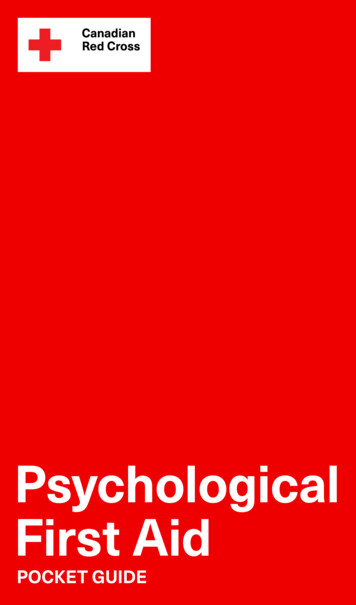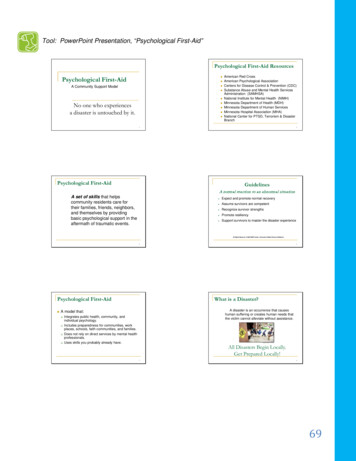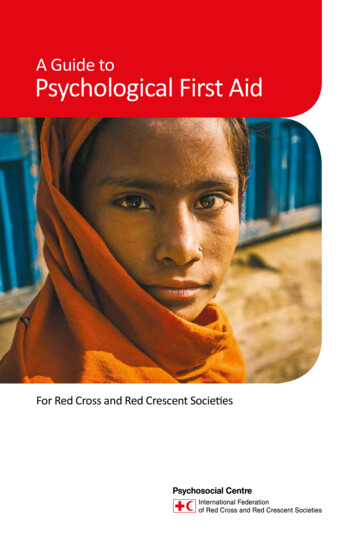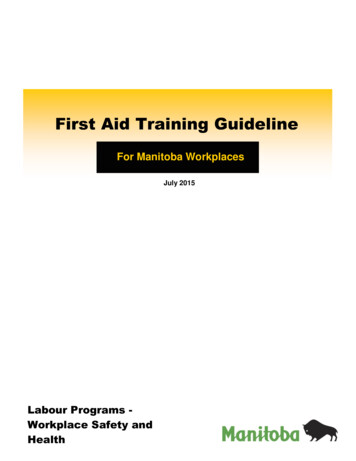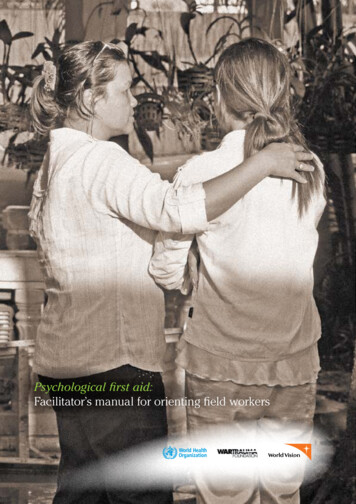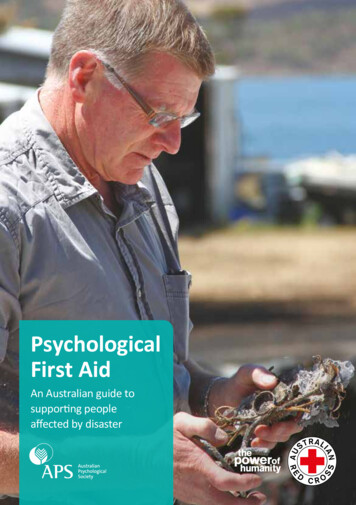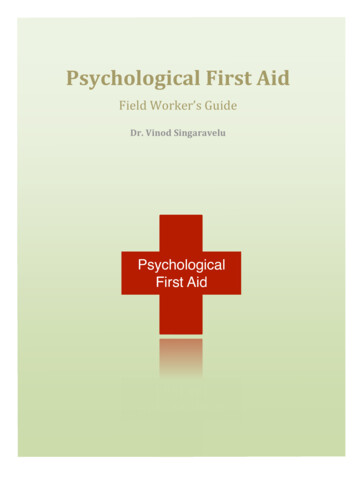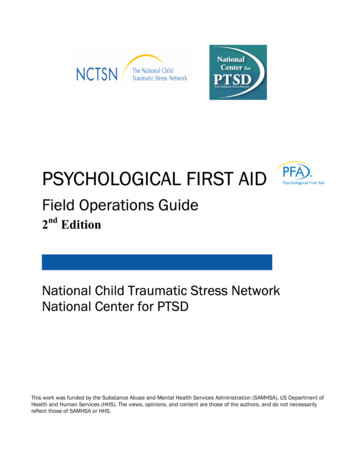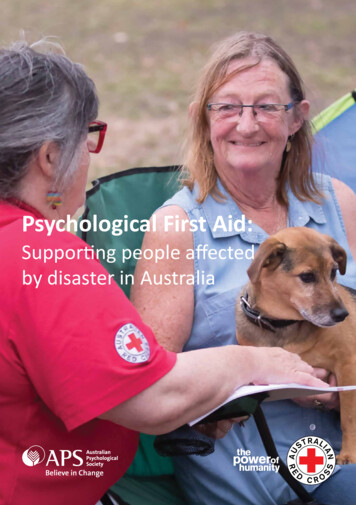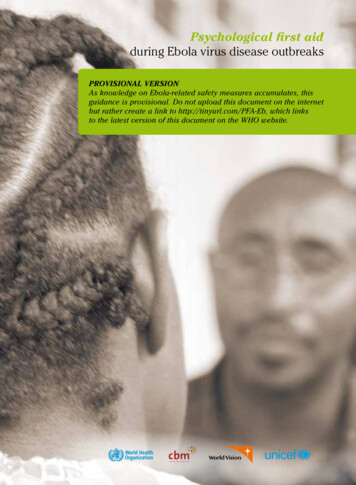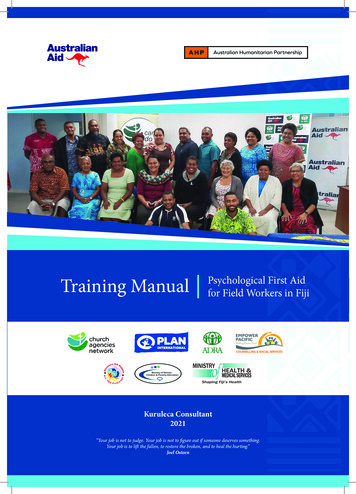
Transcription
Training Manual Psychological First Aid1
Training Manual Psychological First AidKURULECA CONSULTANTSPsychological First Aid (PFA) is the first help that we offer to an individual when they are in need or when we perceive thatthey are in need, following a domestic, national or international (traumatic) event. It is not forced, it is not something thatonly the “professionals” do.It is our intention that individuals, families, communities; the tokatoka, mataqali, yavusa and vanua all learn some of thebasic fundamentals of PFA – offering support through the lens of Look, Listen and Link; practicing Love in Action when yousee someone in need, by offering support whilst also ensuring that you are not being intrusive and directive.Vinaka vakalevu to all those that participated in the pilot trainings, the reviews and the edits. As we go out to practice duringthese times, and particularly so, during this public health emergency of the COVID19 pandemic, I implore you to be resilientin your resolve to practice safely, ethically and competently – today and always.Ms Selina Kuruleca – MA MFT, STTC, BAConsultant PsychotherapistKuruleca ConsultantsSUVA.DisclaimerThis publication has been funded by the Australian Government through the Department ofForeign Affairs and Trade. The views expressed in this publication are the author’s alone and arenot necessarily the views of the Australian Government.May 2021.DOCUMENT CONTROLClientChurch Agencies Network Disaster OperationsProject NamePsychological First Aid: Humanitarian ResponseDocument name Training Manual on Psychological First Aid for Field Workers in FijiReview & Revisions LogDate Version12th December 20191.0/ 2.0Jan 20203.0/ 4.0May 20205.0/ 6.0July 2020 7.0/ 8.0August 20209.0/10.0September 202011.0/12.018th September 202013.022nd September 202014.07th January 202115.030th March 202116.03rd August 202117.02
Training Manual Psychological First AidINTRODUCTIONThe first recorded use of Psychological First Aid in Fiji was in 2012, post TCEvans. TC Evan was a category 3 severe tropical cyclone, that impacted Fiji,Wallis and Futuna, Samoa, American Samoa, Tonga and New Zealand.Since then there has been many a natural disaster of landslides, flooding,cyclones, hurricanes, and public health emergencies such as the COVID19pandemic.This Fiji contextualized manual was initially drafted for CANDO partners asa result of the work done by the humanitarian arms of the various Christiandenominations. However as the work progressed it became evidently clear thatthe training was needed for all responders, and not only Christian responders,and as such, the Christian component has been added as an Annex to thismanual, whilst the entire manual is relevant and can be used to train all firstresponders in Fiji.The primary objective of this manual is to train all first responders in line withNational Humanitarian Policy to :(d) Conduct a national train- the - trainer program to progressively ensure that allcommunities have access to adequate local psycho-social assistance.(o) To enhance recovery schemes to provide psychosocial and mental health servicesfor all people and children, including children in need.Sendai Framework:Priority 4: Enhancing disaster preparedness for effective response and to “BuildBack Better” in recovery, rehabilitation, and reconstruction.National and Local levels: 33 (O)To enhance recovery schemes to provide psychosocial and mental health servicesfor all people in need.Responders after being trained in PFA using this national standard, are expectedto respond to affected individuals through lenses that are gender sensitive, genderneutral are to be used as applicable, disability inclusive – mental, physical, mentaldisabilities as well as sensory impairments, practices Principles of Do No Harm,Informed Consent, Confidentiality; that recognizes that individuals, familiesand communities have changing needs, particularly during a crisis situation,and that being able to respond in a manner that ensures the required servicesand support mechanisms are offered to those in need within the confines ofFijian legislation, guidelines, policies, protocols and SOP where applicable,As First responders, the main task is to respond using the Principles of PFAwithout prejudice, discrimination and within your competency and abilities.First responders and PFA trained individuals representing organizations musthave Codes of Practice and Codes of Ethics that they abide by, and if these Codesare compromised, disciplinary action within each responding organization mustbe instituted and protocols adhered to.The training manual will be reviewed every two years to ensure that it remainsrelevant.3
Training Manual Psychological First AidACKNOWLEDGMENTThere were several consultations prior to the production of this manual. We acknowledgethe following partners who participated and contributed to this manual are:1. National Disaster Management Office (NDMO)2. Ministry of Health and Medical Services (MoHMS)3. Ministry of Women, Children and Poverty Alleviation4. Fiji Council of Social Services5. Fiji Red Cross Society6. Empower Pacific7. Seventh Day Adventist Church, Fiji8. Methodist Church In Fiji9. CARITAS, Suva, Fiji10. International Planned Parenthood Federation, Pacific Region11. UNICEF, Suva, Fiji12. MHPSS TWG, Suva, FIJI13. MHPSS Regional Cell Group14. Safety & Protection Cluster Fiji15. CANDO Partners, Fiji16. Pacific Disability Forum, Suva. Fiji17. ADRA FijiPLAN InternationalADRA in partnership with Empower PacificJanuary 20214
Training Manual Psychological First AidFOREWORD - MINISTER NATIONAL DISASTERMANAGEMENT OFFICEThe unprecedented level of destruction caused by tropical cyclones is a realityfor Fiji. Between the years 2010-2020, the total damage and loss recorded isFJ 2.42 billion which represents 1.25% of total Gross Domestic Product.During that time 9 tropical cyclones made landfall in different parts of Fijicausing 58 casualties. As average temperatures rise; acute hazards, such ascyclones and floods grow in frequency and severity; and chronic hazards, suchas drought and rising sea levels, intensify.For this reason, the Fijian Government took a proactive approach incommitting to the Sendai Framework for Disaster Risk Reduction 2015-2030and by developing and launching its first ever National Disaster Risk ReductionPolicy (NDRRP) in December 2019. The NDRRP is a multi-stakeholderapproach that commits all government ministries, Partners, CSOs and NGOsto work collectively and where the focus is shifting from relief and response topreparedness, mitigation, and disaster risk reduction.The Facilitation Manual on Psychological First Aid for Field Workers is the firstlocalised approach that is focused on building capacity in psychological firstaid in the aftermath of disasters. Development of this manual was highlightedas a recommendation and a lesson learned from TC Winston response.Psychological First Aid response in the past was normally conducted in an adhoc arrangement; this is one of the first attempts to bring everybody togetherunder a standard structure.The Facilitation Manual is the result of a participatory and inclusive exerciseundertaken by ADRA and other partners. The Manual covers the fullemergency cycle including preparedness, response, recovery, and rehabilitation.It articulates the processes involved in providing psychological first aid at thecommunity level utilising a standardised approach.People and children can experience a wide range of emotions before and after adisaster or traumatic event. There is no right or wrong way to feel. However, it isimportant to find healthy ways to cope when these events happen. The manualis an evidence-informed approach for assisting people and children in theimmediate aftermath of disaster to reduce initial distress, and to foster shortand long-term adaptive functioning. The Manual promotes a sense of safety, asense of self and communal control, connectedness, calmness, and hope. Allthese are critical life-saving skills that promote, maintain, and restore individualand community psychosocial well-being. These skills and approaches can beadapted to different contexts and disasters no matter the scale.I would like to express my sincere appreciation to the many stakeholders whocontributed to the compilation of this training manual with special thanksto ADRA for addressing one of the priorities under the current disasterframework. The National Disaster Management Office stands ready to workwith partners in ensuring lives are saved and communities are better preparedfor any type of disaster.Hon. Inia Batikoto SeruiratuMinister for Defence, National Security and Policing, Rural and MaritimeDevelopment and Disaster ManagementSuva FijiMay 1, 20205
Training Manual Psychological First AidFOREWORD - WELLNESS FIJIWellness Fiji started in 2012 with the merging of the Non CommunicableDiseases Unit with the National Centre of Health Promotion. In response tothe Pacific declared NCD Crisis in 2011, Wellness FIJI is a proactive processof becoming aware and making choices towards a healthy and fulfilling life.There are 7 domains of health and wellbeing that are promoted in wellness inthe following order of priority: breathing, thinking, moving, drinking, eating,resting, and reproducing. The 7 domains are promoted through the life coursefrom pregnancy to senior citizens.Wellness Fiji focuses on mental, physical, and sexual/reproductive health andwell-being in the first 18 years of life. It is preferred that parents, though inFijis context, it has been predominately mothers who are empowered to teachand train children on positive thinking or positive mental attitude and howthese may translate to healthy body and well-being. It helps nurture the humanmind from the second week of pregnancy to the 18 year of life in accordancewith brain growth, physical growth, and sexual/reproductive growth.Wellness Fiji is a creative and prospective approach as opposed to the reactiveand retrospective approach to health and well-being – wellness more thanillness. We believe that a Fijian parent who teaches and trains the child to havea proactive, creative mind is more likely to respond positively to challenges inlife like sadness, anxiety, and depression.Wellness Fiji acknowledges the work of all our partners, and we acknowledgethe work of ADRA and its partners in promoting and working extensivelyin this area. We congratulate you on the publication of this manual and areconfident that the training of our first responders using this Psychological FirstAid Manual will further strengthen their mental well-being and those of thecommunities that they serve.Dr. Isimeli TukanaNational Advisor NCDHead of National Wellness CentreMinistry of Health & Medical ServicesSuva FijiMay 1, 20206
Training Manual Psychological First AidOVERVIEWThis Facilitation Manual has been prepared to assist the training of Field Workers in Fiji on Psychological FirstAid. The manual has been adapted from “Psychological First Aid: Guide for Field Workers,” prepared by theWorld Health Organization (WHO), War Trauma Foundation and World Vision. Relevant Fijian guidelinesand policies, including “The Fiji National Humanitarian Policy on Disaster Risk Management,” has also beenused to guide the development of this manual to ensure that it is aligned to Fiji’s national policies. This manualis to be used with the WHO Psychological First Aid: A Guide for Fieldworkers. Other relevant documents havebeen referenced at the end of this manual, and it is recommended for additional readings.During the development of this manual, the coronavirus, later renamed to COVID-19 was declared a pandemicby the WHO. The Interagency Standing Committee (IASC) on Mental Health Psychosocial Support (MHPSS)then developed and released the MHPSS Briefing Note dated February 2020 (v1.1). Where appropriate andrelevant, references have been made to addressing COVID19 and the application of PFA considering thispandemic.This facilitation manual has been designed taking into consideration, the specific country context informedby the leading agencies (Ministry Women, Children and Poverty Alleviation, Ministry of Health and MedicalServices and National Disaster Management Office) and intended to be used by National Disaster ManagementOfficials, Health Officials, Government department officials, Civil Society Organizations, Church AgenciesNetwork of Disaster Operations (CANDO) Partners and their affiliates, Community Based Organizations,Minority groups and their affiliates such as Persons Living with Disabilities and their representatives and theLGBTIIQ representatives, Divisional and District officers and all those who are conducting training or beingtrained on PFA as first responders in a time of disaster.The facilitation manual recognizes the varied capacities of first responders in Fiji, with responders ranging fromvillage headmen, women’s group leaders, youth leaders, minority groups and their leaders, NGO, CSO workersas well as Civil Servants from various sectors and has been designed as a simple tool using adult learningtechniques to communicate the key themes of PFA and its action principles.This contextualized Fiji manual is guided by international recommended standards and protocols that aim:1.To promote sense of safety Help people and children meet basic needs for food and shelter and obtain emergency medicalattention if needed. Provide simple and accurate information on how to get these basic needs met. Stress may alter the individuals’ ability to process information, repeat information as often asnecessary. Acknowledging that vulnerable groups such as children, women, elderly, persons living withdisability, sick and minority groups may have additional needs, and providing simple and accurateinformation on how to get their specific needs met. Promote child safety and their protection in all situations.2.Promote calming Listen to people and children who wish to share their stories and emotions and remember thatthere is no right or wrong way to feel. Being professional yet friendly and compassionate even if people and children are being difficult. Obtain and offer accurate information about the disaster or distress, and the relief efforts underwayto help affected persons and children understand the situation.3.Promote sense of self and communal control Give practical suggestions that steer people and children toward helping themselves. Help people and children regain their sense of control by engaging them in activities to meet theirown needs7
Training Manual Psychological First Aid4.Promote connectedness Help people and children contact friends and loved ones. Keep families together. Keep children with parents or other close relatives whenever possible.5.Promote hope Find out the types and locations of government and nongovernment services and direct peopleand children to those services that are available. When they express fear or worry, remind people and children that more help and services are onthe way (only if you are sure they are).8
Training Manual Psychological First AidTABLE OF CONTENTSIntroduction.3Acknowledgment.4FOREWARD - WELLNESS FIJI.5FOREWARD National Disaster Management Office.6OVERVIEW.7Pre and Post Workshop Questionnaire.10Draft Program.11SESSION 1 MHPSS AND PFA.14Session Objectives.14Learning Outcomes.14Introductions.14What we will cover in the training.14House keeping.15Definitions.15Acronyms.15SESSION 2: UNDERSTANDING THE CONTEXT OF PFA.18Session Objectives:.18Learning Outcomes:.18Preparation and understanding the emergency.18SESSION 3: WHAT IS PSYCHOLOGICAL FIRST AID?.23Session Objective.23Learning Outcomes.23SESSION 4: KEY CONSIDERATIONS WHEN PROVIDING PFA.30Session Objectives:.30Learning Outcomes.30Ethical Considerations.30Cultural Considerations.30SESSION 5: COMMUNICATION.34Session Objectives.34Learning Outcomes.34SESSION 6: PREPARE, PREPARE, PREPARE.39Session Objectives.39Learning Outcomes.39SESSION 7: PROVIDING PFA.41Session Objectives.419
Training Manual Psychological First AidLearning Outcomes.41SESSION 8: PEOPLE AND CHILDREN WHO ARE LIKELYTO NEED SPECIAL ATTENTION.46Session Objective.46Learning Outcomes:.46SESSION 9: CRISIS AND SPIRITUALITY.48Session Objective.48Learning Outcomes:.48SESSION 10: TAKING CARE OF YOURSELF.50Session Objective:.50Learning Outcomes.50Wrapping Up.52ANNEX 1:.54The Faith Based Approach to providing PFA.54FBOs, Religious leaders and PFA.54Individual Activity.57ANNEX 2: Psychological First Aid: Guide for Field Workers 2011.58ANNEX 3: Standardized PFA Initial Assessment Form.59ANNEX 4: Instructions to accompany the PFA Initial assessment Form.61ANNEX 5: Evaluation form.62ANNEX 6: Certificate Template.64References.6610
Training Manual Psychological First AidPre and Post Workshop QuestionnairePrior to the commencement of the workshop, it is recommended that the participants understanding of PFAbe assessed through a brief pre-workshop questionnaire. The same questionnaire is to be circulated at the endof the workshop to assess participants’ learning. This is a tear out page and must be returned to the facilitators atthe end of the training.Name:Place:Date:Please read each statement below carefully.Circle T if you think the statement is True.Circle F if you think the statement is False.Pre test is to be completed BEFORE the workshop; the post test AT THE END of the workshop.Statement1. The goal in providing PFA is to provide an environment of safety,connectedness, and empowerment2. PFA involves helping people meet basic emotional and physical needssuch as food, shelter and obtaining emergency medical care.3. During a traumatic event it is helpful to provide immediate psychotherapy.4. Headaches, nausea, dizziness, fatigue, and loss of appetite are common reactions to stress.5. Children may feel more secure in a structural environment (such asschool) after a traumatic event.6. PFA involves listening to people who wish to share their stories andemotions7. Forcing people to share their stories, especially personal details is partof PFA8. Active Listening includes informing the person the ‘I know how youfeel’ and avoiding asking clarifying questions.9. Many emotions and reactions that would appear unusual in a stablesituation are common and can be anticipated during a disaster.10. Effective communications during times of trauma includes avoidingrepeating information.11. Disasters are more traumatic when they are expected, and the cause isknown12. The 3 main principles of PFA is LOOK LISTEN LINK11Pre – Test FTFTFTF
Training Manual Psychological First AidDraft ProgramPSYCHOLOGICAL FIRST AID TRAININGTIMETOPICSMODE OFTRAINING8.00 - 8.30am8.30 - 9.00amPRESENTERREGISTRATIONSession 1- WelcomeIntroduction, HousekeepingPresentation on Workshop.FacilitatorDAY 1Objectives of the workshop and what we hope toachieve.9.00 - 9.45amSession 2- Understandingthe context of PFA.Facilitated large groupdiscussion9.45 - 10.30amSession 3- What is PFA?Who, When & Where?PowerPointPresentation10.30 - 11.00am11.00 - 1pmMORNING TEASession 4- Key Considerations when providingPFA.Ethical & Cultural Considerations1.00 - 2.00pm2.00pm2.15 - 3.00pmPresentationsFacilitatorSmall group work Reporting backLUNCHEnergizer – Valuesclarifications on a keyleaning outcome from themorning.Group Activity.FacilitatorSession 4 - Cont.Preparation for role play.Facilitator.3.00 - 3.15pm3.15 - 4.30pmFacilitatorAFTERNOON TEARole playing; discussionsof days’ work & wrap upDemonstration role play.Summary of Days Proceedings.12Facilitator
Training Manual Psychological First AidTIMETOPICSMODE OFTRAINING8.00 - 8.30amREGISTRATION8.30- 9.00amOverview Day 1 Homework reviewPresentation on Workshop.9.00-9.45amSession 5 - Communication A key aspect of PFAFacilitated large groupdiscussionCommunication cont’dFacilitator9.45-10.30am10.30-11.00amDAY 211.00-1pm2.15-3.00pmSession 6- Prepare, Prepare, Prepare.FacilitatorPresentationsFacilitatorSmall group work Reporting backLUNCHEnergizer – Valuesclarifications on a keyleaning outcome from themorning.Group Activity.Session 7- Providing PFA Preparation for role play.Group 1- Look, feedback& NING TEA1pm - 2pm2.00pmPRESENTERFacilitatorFacilitatorAFTERNOON TEASession 7- Providing PFA Demonstration role play.Group 1- Look, feedback& demonstration.Summary of Days Proceedings.13Facilitator
Training Manual Psychological First AidTIMETOPICSMODE OFTRAINING8.30 - 8.30amREGISTRATION9.00-10.30amSession 8People and children whoare likely to need specialattention.-Children, personsincluding children livingwith disabilities. People and children at riskof Discrimination andviolenceFacilitator10.30-11.00amDAY 3PRESENTERSmall group work.FacilitatorMORNING TEA11.00-11.30pmSession 9Crisis and SpiritualityGroup work and Feedback Participants.11.30-12.30pmSpirituality cont’dGroup work and Feedback Participants.12.30-1.00pmSession 10Taking care of Yourself.Facilitators wrap up.Discussions andrecommendationsGroup work and RolePlay.1pm - 2pm2.00-3.00pmLUNCH3.00-3.15pmAFTERNOON TEA3.15-4.15pmPresentation ofrecommendationsGroup workFacilitator.4.15-4.45pm.Summary of DaysProceedingsFacilitated SessionFacilitator.Evaluation andCertificate Presentation14
Training Manual Psychological First AidSESSION 1: MHPSS AND PFASession Objectives Mental Health Psychosocial Support (MHPSS) – defining MHPSS and its wider role in emergencysituations Psychological First Aid: Understanding the background and defining it Identifying how to help responsibly Considerations for providing PFA in Fiji Identifying linkages with appropriate agencies in Fiji Implementing self-care strategies Using role plays, practice PFALearning OutcomesAt the end of this 3 day workshop, participants will be expected to: Identify MHPSS it the broadest sense Understand what PFA is Be competent in using PFA along with the IASC guidelines Effectively demonstrate how PFA is used with different populations Recognize their own limitations and refer a client as necessary Effectively network with other agencies in PFA post crisis in FijiIntroductionsAt the beginning of the workshop the facilitator can divide the participants into two groups and give eachperson in group 1 a number from 1 onwards and each person in group 2 a letter from A upwards. The facilitatoris to ask each participant from Group 1 to find their corresponding alphabet in Group 2 i.e. 1 – A, 2 – B, 3-Cand so forth. Once the pairs have been created, each participant should spend some time getting to know theirpartner. Each participant should then introduce their partner to the bigger group, identifying the followingName:Organization:Recent crisis responded to:The facilitator is to list all the events mentioned on a white board or butcher paper for reference.When outlining the overall Workshop Objectives, the facilitator can refer to the following workshop objectivesand learning outcomesWhat we will cover in the training What PFA is and is not Place of PFA in overall response Key resilience factors15
Training Manual Psychological First Aid PFA - Who, when and where of PFA Frequent needs of affected persons and children Action principles: Prepare, Look, Listen and Link Good communication skills People and children who are likely to need special attention Caring for yourself and your team membersHouse keeping Role play – Always de-role after each role play. De-roling is the process by which a person who has been acting in a role play publicly declares at theend of the role play, 3 ways in which they are different from the person that they role played. Confidentiality – some people and children may share personal stories/ experiences during thisworkshop, please keep this information confidential Always use child friendly language and child safe practices Respect for each other - must always be demonstrated through our words and actions If at any time during the training you feel overwhelmed, uncomfortable, or stigmatized and needto stop or leave the training, Please advise the trainers, and professional assistance can be madeavailable to you as required. If you are ever unsure – ASK! ASK! ASK!Definitions Psychological First Aid – this is the first help that is given to someone who is experienced some formof trauma or distress. Mental health & psychosocial support (MHPSS) is used to describe any type of local or outsidesupport that aims to protect or promote psychosocial well-being and/or prevent or treat mental disorder.Acronyms ADRA – Adventist Development & Relief Agency IASC – Inter Agency Standing Committee WHO – World Health Organization? CANDO – Church Agency Network of Disaster OperationsIt is vitally important to understand that PFA exists in a wider framework that is termed as Mental health andPsychosocial Support (MHPSS). PFA is the broadest range of intervention that is offered to protect and orpromote psychological wellbeing.The composite term ‘mental health and psychosocial support’ (MHPSS) is used in the Inter Agency Standing16
Training Manual Psychological First AidCommittee (IASC) Guidelines for MHPSS in Emergency Settings to describe ‘any type of local or outside supportthat aims to protect or promote psychosocial well-being and/or prevent or treat mental health condition’. Theglobal humanitarian system uses the term MH. PSS to unite a broad range of actors responding to emergenciessuch as the COVID-19 outbreak, including those working with biological approaches and socioculturalapproaches in health, social, education and community settings, as well as to ‘underscore the need for diverse,complementary approaches in providing appropriate support’.The IASC Guidelines for MHPSS in Emergency Settings recommends that multiple levels of interventionsbe integrated within outbreak response activities. These levels align with a spectrum of mental health andpsychosocial needs and are represented in a pyramid of intervent
Training Manual Psychological First Aid 3 INTRODUCTION The first recorded use of Psychological First Aid in Fiji was in 2012, post TC Evans. T
